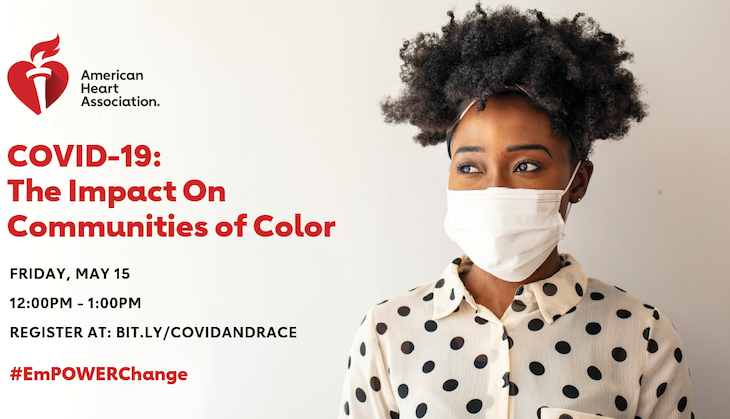Long before the coronavirus impacted how we live, work, and play, systemic challenges contributed to disparities that impede some people from living long, healthy lives.
Your ZIP code should not determine how long you live, but it does. Social factors, which are shaped by the distribution of money, power, and resources, have been mostly responsible for the unfair and avoidable difference in health status.
On Friday, May 15 from 12-1 p.m., the American Heart Association will launch a webinar series designed to discuss the impact of COVID-19 in communities of color. To register, visit: bit.ly/covidandrace
During our series, we will:
- Explore the implications of COVID-19 from the perspective of economics, education, physical, and mental health
- Explain the connection between health disparities and inequities related to the COVID-19 crisis
- Explore solutions to address the current COVID-19 crisis and its future implications
The webinar features the following AHA senior leaders and top health equity leaders:
 Nicole Aiello Sapio, Ed.D. is the executive vice president of the Eastern States region of the American Heart Association. Eastern States is made up of over 400 staff and tens of thousands of volunteers serving the eastern seaboard of the United States from Maine to Virginia, a region made up of 13 states and the District of Columbia. Nicole has been in the nonprofit arena for over 25 years, serving the American Heart Association in various positions of progressive responsibility since 1995. Nicole spent nearly ten years as the executive vice president of the Great Rivers Affiliate of the American Heart Association, based out of Pittsburgh, PA, after serving 15 years in the Mid-Atlantic Affiliate in Washington, DC, in various roles of progressive responsibility. Nicole was named the executive vice president of the Eastern States region in April 2019.
Nicole Aiello Sapio, Ed.D. is the executive vice president of the Eastern States region of the American Heart Association. Eastern States is made up of over 400 staff and tens of thousands of volunteers serving the eastern seaboard of the United States from Maine to Virginia, a region made up of 13 states and the District of Columbia. Nicole has been in the nonprofit arena for over 25 years, serving the American Heart Association in various positions of progressive responsibility since 1995. Nicole spent nearly ten years as the executive vice president of the Great Rivers Affiliate of the American Heart Association, based out of Pittsburgh, PA, after serving 15 years in the Mid-Atlantic Affiliate in Washington, DC, in various roles of progressive responsibility. Nicole was named the executive vice president of the Eastern States region in April 2019.
 Atif Bostic is an established leader in addressing the social determinants of health through entrepreneurial solutions, leveraging his leadership experience in workforce development, business development, business consulting, and finance to create sustainable solutions to social problems. He serves as the executive director of Uplift Solutions, a national nonprofit focused on the development of community-centric and community-informed business assets with direct service work on access to fresh and healthy food, health care, capital, and jobs with advocacy work focused on food justice, criminal justice, and social equity. Mr. Bostic is a member of the American Heart Association’s 2020-2021 Diversity Leadership Committee.
Atif Bostic is an established leader in addressing the social determinants of health through entrepreneurial solutions, leveraging his leadership experience in workforce development, business development, business consulting, and finance to create sustainable solutions to social problems. He serves as the executive director of Uplift Solutions, a national nonprofit focused on the development of community-centric and community-informed business assets with direct service work on access to fresh and healthy food, health care, capital, and jobs with advocacy work focused on food justice, criminal justice, and social equity. Mr. Bostic is a member of the American Heart Association’s 2020-2021 Diversity Leadership Committee.
 Dr. Lisa Cooper is an international thought leader on health disparities and a 2007 MacArthur Fellow who studies how race and socioeconomic factors shape patient care, and how patients and health systems— with communities—can help at-risk populations. She is the author of over 200 publications and has been the principal investigator of more than 15 federal and private foundation grants, and an elected member of the National Academy of Medicine. A Liberian-born general internist and social epidemiologist, Dr. Cooper founded and directs the Johns Hopkins Center for Health Equity, where she and her team work in partnership with health system and community-based organizations to identify interventions that alleviate racial and income disparities, and translate them into policy changes that mean better health for communities. Dr. Cooper is also the inaugural recipient of the American Heart Association’s Watkins-Saunders Award which recognizes excellence in clinical, medical, and community work focused on diminishing health care disparities in Maryland.
Dr. Lisa Cooper is an international thought leader on health disparities and a 2007 MacArthur Fellow who studies how race and socioeconomic factors shape patient care, and how patients and health systems— with communities—can help at-risk populations. She is the author of over 200 publications and has been the principal investigator of more than 15 federal and private foundation grants, and an elected member of the National Academy of Medicine. A Liberian-born general internist and social epidemiologist, Dr. Cooper founded and directs the Johns Hopkins Center for Health Equity, where she and her team work in partnership with health system and community-based organizations to identify interventions that alleviate racial and income disparities, and translate them into policy changes that mean better health for communities. Dr. Cooper is also the inaugural recipient of the American Heart Association’s Watkins-Saunders Award which recognizes excellence in clinical, medical, and community work focused on diminishing health care disparities in Maryland.

Keith B. Churchwell, M.D., FACC, FAHA, FACP is the executive vice president and chief operating officer for Yale New Haven Hospital. He was previously the senior vice president of Operations and executive director of the Heart and Vascular Center and Transplantation Center, as well as the clinical service coordinator for the Department of Medicine at Yale New Haven Hospital and associate clinical professor of Medicine at the Yale School of Medicine. Dr. Churchwell is a graduate of Harvard University and Washington University School of Medicine. He spent his formative training years at Emory University Medical School and Affiliated Hospitals, then spent 12 years in private cardiology practice before joining Vanderbilt Medical School as full-time academic faculty in 2006. At Vanderbilt, Dr. Churchwell was an associate professor of Medicine and Radiology and the executive director/chief medical officer of the Vanderbilt Heart and Vascular Institute from 2009-2014. Dr. Churchwell serves on the National Board of Directors of the American Heart Association and is the chair of the National Advocacy Committee for AHA through 2021. He is past president of the former American Heart Association, Founders Affiliate.

Gerald E. Johnson II serves as executive vice president, Health Equity, and chief diversity officer of the American Heart Association. He is responsible for leading strategy, growing investment, and driving impact for equitable health and well-being globally. Mr. Johnson brings a wealth of consumer and B2B marketing experience from major Fortune 500 Companies including Unilever, Nabisco, Dr. Pepper/7-UP, Cadbury Schweppes, ConAgra Foods and Magic Johnson Enterprises. During his career, Mr. Johnson has held various leadership positions in marketing, including previously as chief marketing officer for Magic Johnson Enterprises and the Magic Johnson Foundation. Gerald remains an active volunteer for the American Heart Association and a multitude of worthy causes.

Tanya M. Odom, Ed.M. is a global consultant, writer, coach, and diversity, equity, and inclusion and civil rights thought leader. She has worked globally for over 20 years, in over 40 countries, as a consultant, coach, storyteller, and facilitator. Tanya’s unique career has allowed her to work in the education, private sector/corporate, not-for-profit/NGO, law enforcement, and in university/college arenas. She is the co-author of ”Evaluation in the Field of Education for Democracy, Human Rights and Tolerance.” Tanya is a frequent contributor to the Huffington Post; she also writes for CNN.com and her work has appeared in Diversity Woman Magazine, Bloomberg News, and The Village Voice. She was named by Diversity Best Practices as “A Diversity Thought Leader to Follow on Twitter.” Tanya is Chair of the Diversity Leadership Committee of the American Heart Association.

Reginald L. Robinson, M.D., specializes in non-invasive cardiology and is a cardiologist at MedStar Washington Hospital Center in Washington, D.C. Dr. Robinson received his B.S. from Morehouse College, and his Post-B.S. and M.D. from Howard University. He completed his residency in internal medicine at Temple University Hospital, where he ultimately became Chief Cardiology Fellow. Dr. Robinson is a member of the American Heart Association, Eastern States Board of Directors, and former American Heart Association Greater Washington Region past president.
Visit easternstates.heart.org/covidandrace for more information on the COVID-19: Impact on Communities of Color webinar series. We also encourage you to visit empoweredtoserve.org if you’re interested in driving change through health justice and empowerment in your community.
Information on COVID-19 can be found at heart.org/coronavirus.
